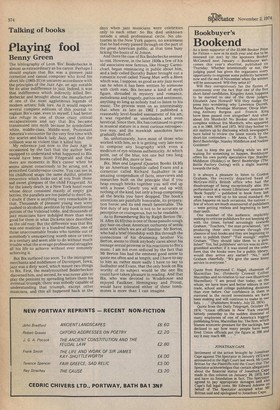Talking of books
Playing fool
Benny Green
The bibliography of Leon `Bix' Beiderbecke is almost as extraordinary as his career. Perhaps I should explain that Bix was a pioneer jazz cornettist and casual composer who lived his short life (1903-31)in uncanny accordance with the principles of the Jazz Age, an age notable for its utter indifference to jazz. Indeed, it was that indifference which indirectly killed Beiderbecke and brought about the manufacture of one of the most agglutinous legends of modern artistic folk lore. As it would require several complete editions of this journal to explain Bix's case, even to myself, I had better take refuge in one of those crazy critical encapsulations and say that Bix became transmuted into myth because he symbolised white, middle-class, Middle-west, Protestant America's encounter for the very first time with the scarlet-and-black lady Jazz, and that the collision was so violent that it killed him My reference just now to the Jazz Age is occasioned by the fact that the author best equipped to understand what happened to Bix would have been Scott Fitzgerald and that there are moments in Bix's career when he seems almost consciously to be acting out a prescribed Gatsbyesque course. You can see in his childhood snaps the same dutiful, pristine innocence which looks out at you from those sad sweet glimpses of the child Fitzgerald. As for the lonely death, in a New York hotel room whose decor consisted mainly of empty gin bottles, the parallels are too painful to dwell on. I doubt if there is anything very remarkable in that. Thousands of pleasant young men were pushed to alcoholic perdition by the pestilential pietism of the Volstead lobby, and thousands of jazz musicians have indulged more than was good for them in what Dickens once described as the old rosy. But the difference was that Bix was one musician in a hundred million, one of those unaccountable freaks who tumble out of somebody's unsuspecting womb once or twice in a century and seem able to do without much trouble what the average professional struggles all his life to achieve without ever remotely achieving it.
But Bix surfaced too soon. To the immigrant merchants and middlemen of Davenport, Iowa, jazz was a dirty word, which meant two things to Bix. First, the mealymouthed Beiderbeckes disowned him, and second, he was never able to play the penitent by spreading before them his eventual triumph; there was nobody capable of understanding that triumph, except other musicians, and this all happened back in the days when jazz musicians were celebrities only to each other. So Bix died unknown outside a small professional circle. No obituaries in the New York papers, no awareness that he had every passed through on the part of the great American public, at that time busy licking the boots of Al Jolson.
And there the case of Bix Beiderbecke seemed to rest. However, in the later 1930s a few of his old associates now famous, like Hoagy Carmichael, began reminiscing in public about him, and a lady called Dorothy Baker brought out a romantic novel called Young Man with a Horn which was, I suppose, as good as any jazz novel can be when it has been written by someone with cloth ears. Bix became a kind of myth figure, shrouded in mystery and romance, melodrama and tragedy, pathos and sentiment, anything so long as nobody had to listen to his music. The process went on so interminably that when as late as 1962 I published a reasonably level-headed assessment of his art, it was regarded as unorthodox and even heretical. Since then, Bix has continued to grow in musical stature in a most curious retrospective way, and the mawkish anecdotes have gradually died off.
So, unfortunately, have most of those who worked with him, so it is getting very late now to compose any biography with even a modicum of eye-witness authenticity. At which point, out of the blue, not one but two long books called Bix, more or less.
Bix, Man and Legend (Quartet Books 6195) by an American bixophile called Evans and a cornettist called Richard Sudhalter is an amazing compendium of facts, interviews and researches built on the principle that if you heap enough bricks together you will end up with a house. Clearly you will end up with nothing of the kind, but only a heap comprising all the bricks you have dropped. The book's intentions are painfully honorable, its preparation heroic and its end result lamentable. The first duty of any book is not to be accurate or perceptive or courageous, but to be readable.
As to Remembering Bix by Ralph Berton (W. H. Allen 64.95) this is one of those pseudo-tough guy hair-on-chest American outbursts of senile acne with which we are all familiar. Mr Berton, who had a brief friendship with Bix through the connections of his drumming brother Vic Berton, seems to think anybody cares about his teenage sexual prowess or his reactions to Bix's music. I am not even seduced by the fact that Mr Berton has had the eminent good sense to quote me often and at length; and I have to say to him as, rather more sadly I have to say to Sudhalter and Evans, that the only book on Bix worthy of its subject would be the one Bix could have taken pleasure in reading. And that Bix, who was devoted to Wodehouse and enjoyed Faulkner, Hemingway and Proust, would have tolerated either of these tombstones is more than I can imagine.


































 Previous page
Previous page